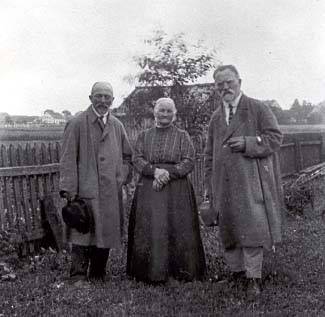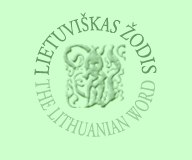 MARTYNAS
JANKUS, (1858-1946), journalist, "Patriarch of Lithuania
Minor," born in Bitenai, county of Pagegiai (formerly Ragaine),
on August 7, 1858. His youth coincided with an intensive Germanization
campaign in Lithuania Minor, the Lithuanian-inhabited territories of
East Prussia. Self-taught, he was particularly well versed in
Lithuanian history and he formed an early determination to resist
German encroachments and to fight for the right of his people. His
Lithuanianism was strengthened by his acquaintance with J.
Sauervein-Girenas in 1878. He contributed to the periodical Ausra
(Dawn), herald of the Lithuanian national revival, and was its
managing editor in 1884-1885. MARTYNAS
JANKUS, (1858-1946), journalist, "Patriarch of Lithuania
Minor," born in Bitenai, county of Pagegiai (formerly Ragaine),
on August 7, 1858. His youth coincided with an intensive Germanization
campaign in Lithuania Minor, the Lithuanian-inhabited territories of
East Prussia. Self-taught, he was particularly well versed in
Lithuanian history and he formed an early determination to resist
German encroachments and to fight for the right of his people. His
Lithuanianism was strengthened by his acquaintance with J.
Sauervein-Girenas in 1878. He contributed to the periodical Ausra
(Dawn), herald of the Lithuanian national revival, and was its
managing editor in 1884-1885.
- Influenced by the Ausra movement and
his visit to Lithuania, Jankus became an ardent advocate of the
reunification of Lithuania Minor with the mainland. To propagate his ideas
he acquired a little printing press in 1889 and published several
periodicals, including Garsas (Sound), 1886-1887 and Sauletaka
(Sunrise), 1900-1902, in which his verse and articles appeared. He also
wrote and published many pamphlets, booklets, and calendars. They were of
little literary value but useful in spreading the habit of reading in
Lithuanian. He was one of the founders of the nationalist association Birute
in 1885 and headed it in 1889-1892. Since 1890 he led the fight for the
election of Lithuanian representatives to German parliaments. By 1914 he had
been arrested nine times by the German authorities. During World War I he
was deported to Russia with his family. In the Petrograd Lithuanian
Convention in 1917 he expressed the will of the inhabitants of Lithuania
Minor to merge with a restored State of Lithuania.
- After the war Jankus devoted his efforts
primarily to the recovery of the Klaipeda (Memel) area for Lithuania, a goal
achieved in 1923. Retiring on a government pension in 1925, he settled in
Bitenai, where he was honorary guardian of the historic mountain Rambynas.
After Hitler's annexation of the Klaipeda area in 1939, he was compelled to
move to Kaunas. During the German occupation of Lithuania (1941-1944) he was
forbidden to make public speeches. In 1944 he was evacuated to Husum,
Germany. He
died in Flensburg, Schleswig-Holstein, on May 23, 1946.
Literature:
ENCYCLOPEDIA LITUANICA I-VI, 1970-1978, Boston
|

